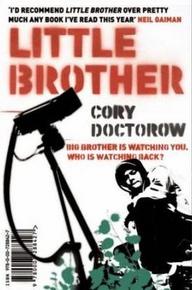If you love freedom, if you think the human condition is dignified by privacy, by the right to be left alone, by the right to explore your weird ideas provided you don't hurt others, then you have common cause with the kids whose web-browsers and cell phones are being used to lock them up and follow them around.This is an excerpt from the introduction to Little Brother, by Cory Doctorow.
If you believe that the answer to bad speech is more speech — not censorship — then you have a dog in the fight.
If you believe in a society of laws, a land where our rulers have to tell us the rules, and have to follow them too, then you're part of the same struggle that kids fight when they argue for the right to live under the same Bill of Rights that adults have.
This book is meant to be part of the conversation about what an information society means: does it mean total control, or unheard-of liberty? It's not just a noun, it's a verb, it's something you do.
This is a very puzzling novel. Doctorow has a message he wants to spread, and he's not very subtle about it.
A terrorist attack in San Francisco gives rise to a state run by the Department of Homeland Security, by which 17-year-old Marcus is tortured, his right to privacy confiscated, his entire way of life threatened.
This novel was on the reading list for the MOOC Fantasy and Science Fiction: the Human Mind, Our Modern World. One of the issues to arise in the discussion forums was whether this novel should be considered science fiction. The professor posits that it's a thought experiment, a what-if novel. But some students observe that there's no what-if about it.
This is not a novel for readers. This is a novel for schoolchildren. It includes a history of civil rights movements and discussion of civil liberties, as well as a history of underground communications and Internet computing. I believe the tiresome explication is a desperate plea to be taken seriously.
Little Brother is a contradiction. It is free for download while being a marketing brochure for the bookstores of corporate America (every chapter is dedicated to a bookstore deemed significant by Doctorow, including Amazon and several large chainstore). It is didactic enough for inclusion on school curricula, while purporting to be a defense of autodidacticism. Its intent can only be to subvert from within. It is a how-to guide to hacking. It is a call to revolution.
This is not a novel. This is a manifesto. It is not about the future; it is about the now.
In many ways, I think this is not a very good novel. But I think it's a necessary book. It lacks subtlety, because the world of today lacks subtlety. It is attempting to equip the youth of today, who through our overprotection are sadly ill-prepared to face some social and political realities. What Doctorow has to say is more important than how he says it.
"Never underestimate the determination of a kid who is time-rich and cash-poor."



1 comment:
Very interesting. I've not read a Doctorow novel before and I have seen a few blogs mention the book as being so so, but I have found your review most interesting especially your comment that it is more of a manifesto. Doesn't make me want to read the book for the story but it does make me want to read it out of curiosity.
Post a Comment